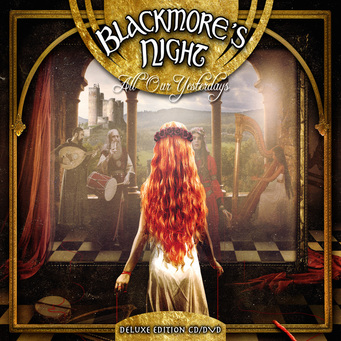Album Review: Blackmore's Night - 'All Our Yesterdays'.
“Once not very long ago”, begins the opening title track on ‘All Our Yesterdays’. It might not be very long ago in the grand scheme of things, but can it really be eighteen years since Blackmore’s Night first arrived upon rock’s shire? Incredibly, the answer is “yes”, and ten albums into a career that many struggled to comprehend when it was first revealed, Ritchie Blackmore and wife Candice Night are back with ‘All Our Yesterdays’, their latest release of renaissance-inspired fayre.
Blackmore’s decision to abandon his hard rock credentials in 1997 for a life of medieval folk acoustica was back then, greeted with shock and dismay by certain factions who just couldn’t accept that the man in black wanted to try something different. Blackmore’s Night was certainly that, and the legendary guitarist left his past behind, forging ahead and gaining a whole new audience who lapped up his act’s dressing-up and performing in castles shtick. Whichever side you’re on, you’ve got to admire the tenacity of the man who has stuck resolutely to the most unique formula, and unsurprisingly, ‘All Our Yesterdays’ continues exactly along those same paths that previous Blackmore’s Night releases have traversed. The first taste of the album that most will have gotten will have been of the jaunty title track, which has been released as its first video. It’s a fair indication of what lies in store, however the release as a whole can generally be divided into three categories; original vocal songs, instrumentals and cover versions. First up, the originals, and whereas the likes of the mournsome ‘Earth Wind And Sky’ and the opposing gaiety of ‘Coming Home’ are typical of the type of folky material that the band is built on, it’s the semi-electric ‘Where Are We Going From Here’ that really shines. Featuring politely restrained bass, drums and that unmistakable electric guitar tone, it offers a fleeting glimpse of the Blackmore of old, and is the album’s undoubted standout. The instrumentals meanwhile follow a similar pattern, with acoustic pieces countered by a lone plugged-in number. While with cheerful ‘Allan Yn N Fan’ and succinct ‘Queen’s Lament’ stick to the traditional formula, the haunting ‘Darker Shade Of Black’ benefits from the addition of a rhythm section and electric guitar. A knowingly titled ballad with obvious nods to Procol Harum’s seminal ‘Whiter Shade Of Pale’, it also utilises cellos, Hammond organ and choral voice to eerily evocative effect. Finally, there are the covers. Of the two, the slightly re-worded version of Sonny & Cher’s ‘I Got You Babe’ is the most surprising. What may at first seem like a bizarre choice, it fits in perfectly with Blackmore’s Night’s aesthetic. The band also tackles Mike Oldfield’s ‘Moonlight Shadow’ in a faithful retelling. The only surprising thing about the latter is that is that they haven’t done it before. Overall, ‘All Our Yesterdays’ is exactly what anyone who has followed Richie Blackmore’s career for the past two decades would come to expect. Those that hanker after the yesterdays when the tempestuous icon peeled off hard rock licks from a Stratocaster may retreat to their Deep Purple and Rainbow collections. Either way, mead; optional. First published on uberrock.co.uk, 14 September 2015. |
|
© 2016 - 2024 eonmusic.co.ukContact: [email protected]
|
